Employee Motivation in Business Management: Factors and Strategies
VerifiedAdded on 2023/06/14
|8
|2063
|499
Report
AI Summary
This report examines employee motivation within the context of business management, focusing on the factors that influence an individual's desire to work effectively. It explores Maslow's hierarchy of needs, differentiating between extrinsic and intrinsic motivation, and analyzes how financial rewards, recognition, and a positive work culture can motivate employees. The report further discusses the positive factors employees experience, such as constructive feedback and supportive management, as well as negative factors like lack of recognition and poor working conditions. Strategies to cope with these negative factors, including promoting employee participation, fostering healthy relationships, and ensuring fair pay, are also addressed. The report concludes that motivation is crucial for enhancing employee productivity and that addressing both positive and negative factors is essential for creating a supportive and efficient work environment. Desklib provides numerous resources and solved assignments for students.
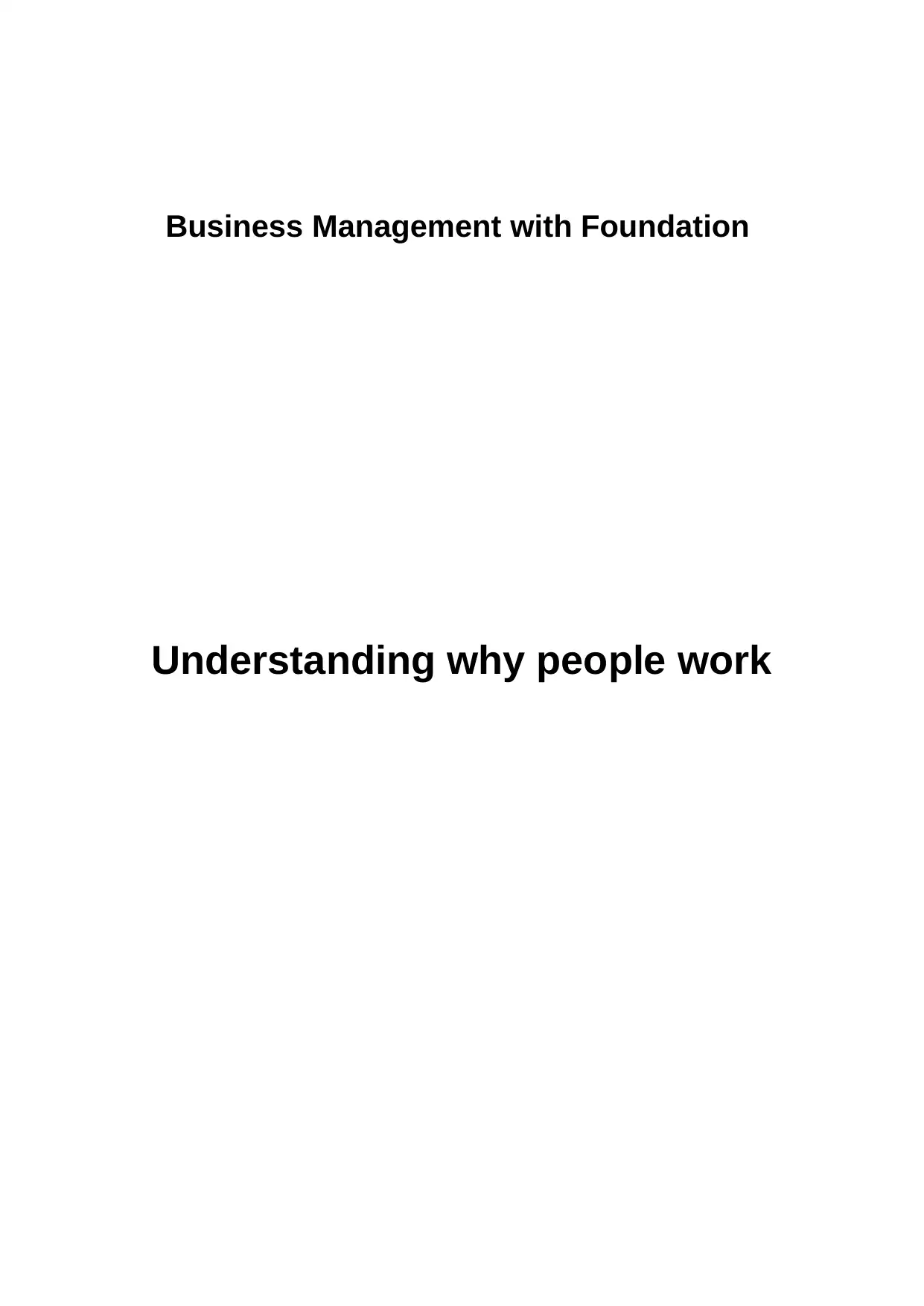
Business Management with Foundation
Understanding why people work
Understanding why people work
Paraphrase This Document
Need a fresh take? Get an instant paraphrase of this document with our AI Paraphraser
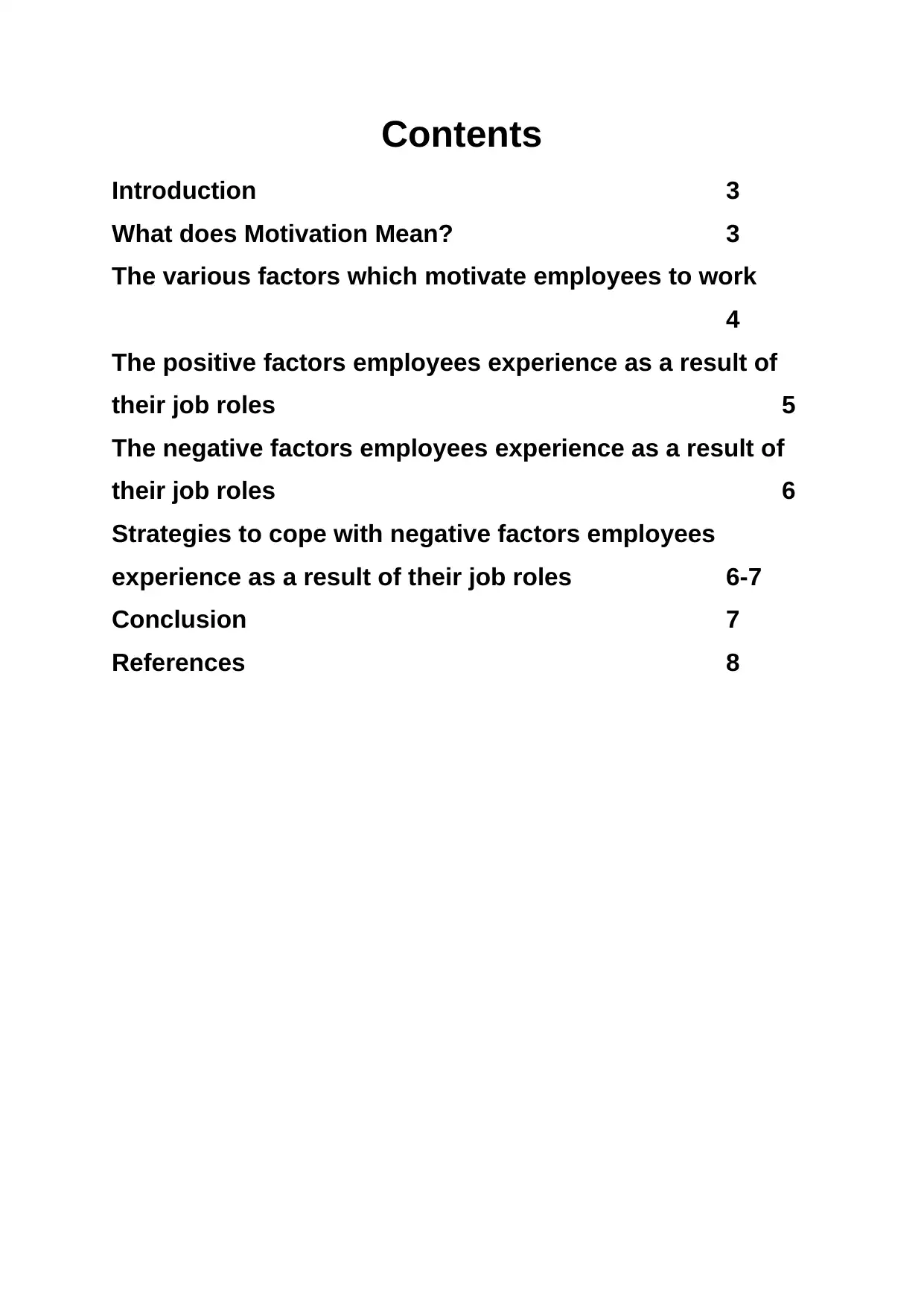
Contents
Introduction 3
What does Motivation Mean? 3
The various factors which motivate employees to work
4
The positive factors employees experience as a result of
their job roles 5
The negative factors employees experience as a result of
their job roles 6
Strategies to cope with negative factors employees
experience as a result of their job roles 6-7
Conclusion 7
References 8
Introduction 3
What does Motivation Mean? 3
The various factors which motivate employees to work
4
The positive factors employees experience as a result of
their job roles 5
The negative factors employees experience as a result of
their job roles 6
Strategies to cope with negative factors employees
experience as a result of their job roles 6-7
Conclusion 7
References 8
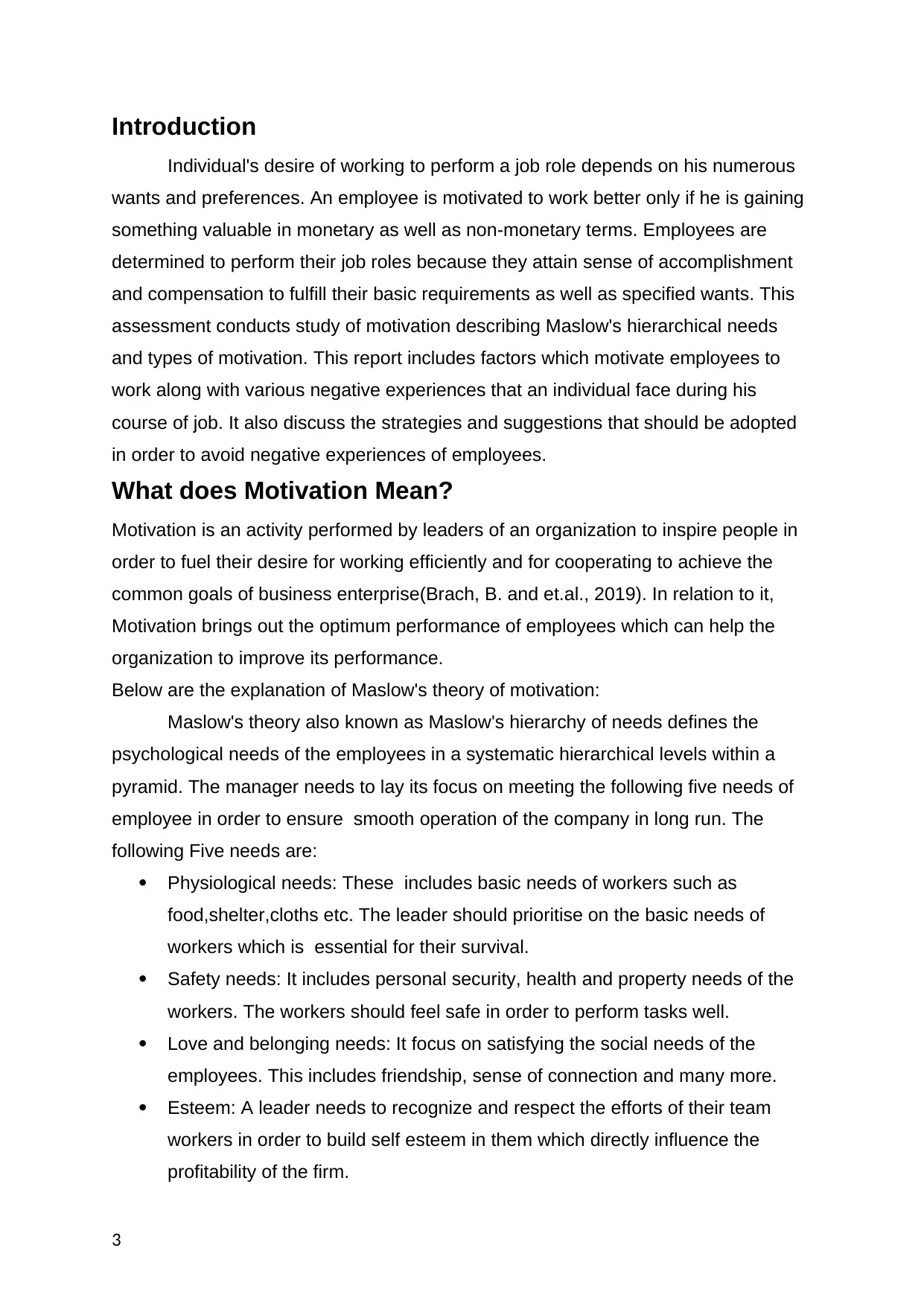
Introduction
Individual's desire of working to perform a job role depends on his numerous
wants and preferences. An employee is motivated to work better only if he is gaining
something valuable in monetary as well as non-monetary terms. Employees are
determined to perform their job roles because they attain sense of accomplishment
and compensation to fulfill their basic requirements as well as specified wants. This
assessment conducts study of motivation describing Maslow's hierarchical needs
and types of motivation. This report includes factors which motivate employees to
work along with various negative experiences that an individual face during his
course of job. It also discuss the strategies and suggestions that should be adopted
in order to avoid negative experiences of employees.
What does Motivation Mean?
Motivation is an activity performed by leaders of an organization to inspire people in
order to fuel their desire for working efficiently and for cooperating to achieve the
common goals of business enterprise(Brach, B. and et.al., 2019). In relation to it,
Motivation brings out the optimum performance of employees which can help the
organization to improve its performance.
Below are the explanation of Maslow's theory of motivation:
Maslow's theory also known as Maslow's hierarchy of needs defines the
psychological needs of the employees in a systematic hierarchical levels within a
pyramid. The manager needs to lay its focus on meeting the following five needs of
employee in order to ensure smooth operation of the company in long run. The
following Five needs are:
Physiological needs: These includes basic needs of workers such as
food,shelter,cloths etc. The leader should prioritise on the basic needs of
workers which is essential for their survival.
Safety needs: It includes personal security, health and property needs of the
workers. The workers should feel safe in order to perform tasks well.
Love and belonging needs: It focus on satisfying the social needs of the
employees. This includes friendship, sense of connection and many more.
Esteem: A leader needs to recognize and respect the efforts of their team
workers in order to build self esteem in them which directly influence the
profitability of the firm.
3
Individual's desire of working to perform a job role depends on his numerous
wants and preferences. An employee is motivated to work better only if he is gaining
something valuable in monetary as well as non-monetary terms. Employees are
determined to perform their job roles because they attain sense of accomplishment
and compensation to fulfill their basic requirements as well as specified wants. This
assessment conducts study of motivation describing Maslow's hierarchical needs
and types of motivation. This report includes factors which motivate employees to
work along with various negative experiences that an individual face during his
course of job. It also discuss the strategies and suggestions that should be adopted
in order to avoid negative experiences of employees.
What does Motivation Mean?
Motivation is an activity performed by leaders of an organization to inspire people in
order to fuel their desire for working efficiently and for cooperating to achieve the
common goals of business enterprise(Brach, B. and et.al., 2019). In relation to it,
Motivation brings out the optimum performance of employees which can help the
organization to improve its performance.
Below are the explanation of Maslow's theory of motivation:
Maslow's theory also known as Maslow's hierarchy of needs defines the
psychological needs of the employees in a systematic hierarchical levels within a
pyramid. The manager needs to lay its focus on meeting the following five needs of
employee in order to ensure smooth operation of the company in long run. The
following Five needs are:
Physiological needs: These includes basic needs of workers such as
food,shelter,cloths etc. The leader should prioritise on the basic needs of
workers which is essential for their survival.
Safety needs: It includes personal security, health and property needs of the
workers. The workers should feel safe in order to perform tasks well.
Love and belonging needs: It focus on satisfying the social needs of the
employees. This includes friendship, sense of connection and many more.
Esteem: A leader needs to recognize and respect the efforts of their team
workers in order to build self esteem in them which directly influence the
profitability of the firm.
3
⊘ This is a preview!⊘
Do you want full access?
Subscribe today to unlock all pages.

Trusted by 1+ million students worldwide

Self actualization: This is the last need of employees which consist of
acceptance, morality,creativity and many more. Satisfaction of these needs
inspire the workers to achiever their full potential.
Meaning of Extrinsic and intrinsic motivation:
Extrinsic motivation: This motivation refers to change in behavior of workers to
perform well due to external rewards by leaders. For example: the leader can
provide cash incentive for performing well in the task.
Intrinsic motivation: It defines change in behavior of workers to do well due to their
inner motivation, For example: A worker enjoys working in a team because they
enjoy collaboration.
The various factors which motivate employees to work
Financial rewards: Good salary is crucial motivation factor required for
boosting the willingness to work more energetically in the mind of workers.
Along with it, giving various opportunities to workers in order to enjoy cash
benefits for their hard work can also enhance the motivation level of
employees(Treadway and et.al., 2021). For examples, the manager can give
competitive salary,promotion,bonuses and overtime payments for retaining
the worthy talents.
Recognition and appreciation: It is one of the important factors of
motivation within company. By giving proper appreciation for employee's
efforts the manager can boost their self esteem which can directly improve the
performance of the organization.
Positive work culture: A positive work environment can greatly impact
employee motivation in workplace. Worker's feel more valued when their
sentiments and thoughts are respected by their leader. In relation to it,
employee's give best performance when manager shows equality and
compassion towards employees. Hence, a positive working environment can
do wonders in motivating workers to perform optimally and efficiently.
The positive factors employees experience as a result of
their job roles
• Constructive feedback: An employee feels sense of self worth and highly
confident if being recognized and appreciated by their supervisors. Proper
4
acceptance, morality,creativity and many more. Satisfaction of these needs
inspire the workers to achiever their full potential.
Meaning of Extrinsic and intrinsic motivation:
Extrinsic motivation: This motivation refers to change in behavior of workers to
perform well due to external rewards by leaders. For example: the leader can
provide cash incentive for performing well in the task.
Intrinsic motivation: It defines change in behavior of workers to do well due to their
inner motivation, For example: A worker enjoys working in a team because they
enjoy collaboration.
The various factors which motivate employees to work
Financial rewards: Good salary is crucial motivation factor required for
boosting the willingness to work more energetically in the mind of workers.
Along with it, giving various opportunities to workers in order to enjoy cash
benefits for their hard work can also enhance the motivation level of
employees(Treadway and et.al., 2021). For examples, the manager can give
competitive salary,promotion,bonuses and overtime payments for retaining
the worthy talents.
Recognition and appreciation: It is one of the important factors of
motivation within company. By giving proper appreciation for employee's
efforts the manager can boost their self esteem which can directly improve the
performance of the organization.
Positive work culture: A positive work environment can greatly impact
employee motivation in workplace. Worker's feel more valued when their
sentiments and thoughts are respected by their leader. In relation to it,
employee's give best performance when manager shows equality and
compassion towards employees. Hence, a positive working environment can
do wonders in motivating workers to perform optimally and efficiently.
The positive factors employees experience as a result of
their job roles
• Constructive feedback: An employee feels sense of self worth and highly
confident if being recognized and appreciated by their supervisors. Proper
4
Paraphrase This Document
Need a fresh take? Get an instant paraphrase of this document with our AI Paraphraser
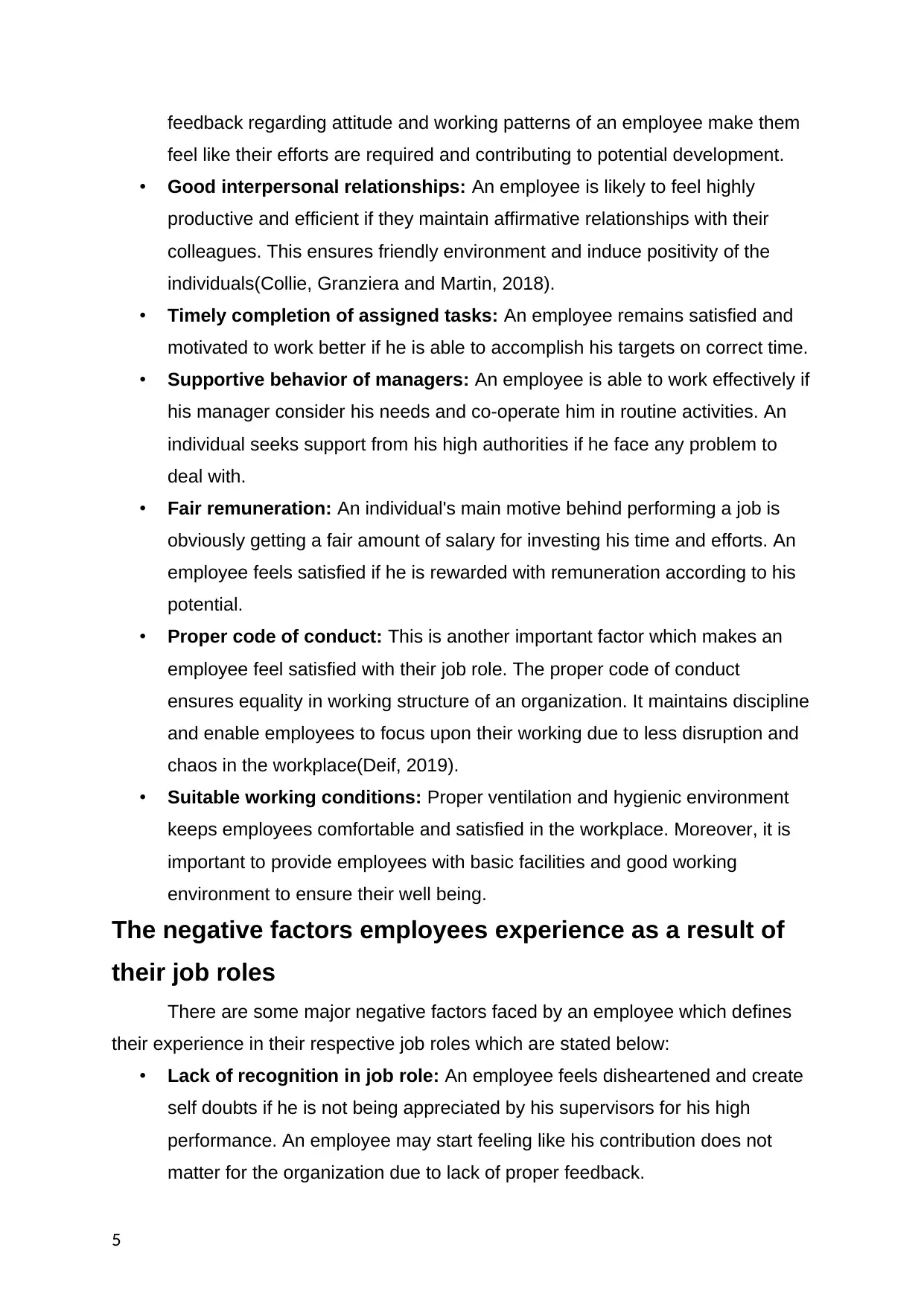
feedback regarding attitude and working patterns of an employee make them
feel like their efforts are required and contributing to potential development.
• Good interpersonal relationships: An employee is likely to feel highly
productive and efficient if they maintain affirmative relationships with their
colleagues. This ensures friendly environment and induce positivity of the
individuals(Collie, Granziera and Martin, 2018).
• Timely completion of assigned tasks: An employee remains satisfied and
motivated to work better if he is able to accomplish his targets on correct time.
• Supportive behavior of managers: An employee is able to work effectively if
his manager consider his needs and co-operate him in routine activities. An
individual seeks support from his high authorities if he face any problem to
deal with.
• Fair remuneration: An individual's main motive behind performing a job is
obviously getting a fair amount of salary for investing his time and efforts. An
employee feels satisfied if he is rewarded with remuneration according to his
potential.
• Proper code of conduct: This is another important factor which makes an
employee feel satisfied with their job role. The proper code of conduct
ensures equality in working structure of an organization. It maintains discipline
and enable employees to focus upon their working due to less disruption and
chaos in the workplace(Deif, 2019).
• Suitable working conditions: Proper ventilation and hygienic environment
keeps employees comfortable and satisfied in the workplace. Moreover, it is
important to provide employees with basic facilities and good working
environment to ensure their well being.
The negative factors employees experience as a result of
their job roles
There are some major negative factors faced by an employee which defines
their experience in their respective job roles which are stated below:
• Lack of recognition in job role: An employee feels disheartened and create
self doubts if he is not being appreciated by his supervisors for his high
performance. An employee may start feeling like his contribution does not
matter for the organization due to lack of proper feedback.
5
feel like their efforts are required and contributing to potential development.
• Good interpersonal relationships: An employee is likely to feel highly
productive and efficient if they maintain affirmative relationships with their
colleagues. This ensures friendly environment and induce positivity of the
individuals(Collie, Granziera and Martin, 2018).
• Timely completion of assigned tasks: An employee remains satisfied and
motivated to work better if he is able to accomplish his targets on correct time.
• Supportive behavior of managers: An employee is able to work effectively if
his manager consider his needs and co-operate him in routine activities. An
individual seeks support from his high authorities if he face any problem to
deal with.
• Fair remuneration: An individual's main motive behind performing a job is
obviously getting a fair amount of salary for investing his time and efforts. An
employee feels satisfied if he is rewarded with remuneration according to his
potential.
• Proper code of conduct: This is another important factor which makes an
employee feel satisfied with their job role. The proper code of conduct
ensures equality in working structure of an organization. It maintains discipline
and enable employees to focus upon their working due to less disruption and
chaos in the workplace(Deif, 2019).
• Suitable working conditions: Proper ventilation and hygienic environment
keeps employees comfortable and satisfied in the workplace. Moreover, it is
important to provide employees with basic facilities and good working
environment to ensure their well being.
The negative factors employees experience as a result of
their job roles
There are some major negative factors faced by an employee which defines
their experience in their respective job roles which are stated below:
• Lack of recognition in job role: An employee feels disheartened and create
self doubts if he is not being appreciated by his supervisors for his high
performance. An employee may start feeling like his contribution does not
matter for the organization due to lack of proper feedback.
5

• Discouragement of employees participation: An individual is frequently
desired to get involved in office events and activities that are likely to affect
their work. If managers do not respect or ask for employees suggestions,
employees started to feel negativity around them.
• Poor working conditions: Working conditions which affect health of
employees mentally or physically are highly discouraged in workplaces. It can
affect the productivity of an employee and might be a cause of untimely
completion of targets(Mahmoud Ali El-Zeiny, 2018).
• Interpersonal conflicts: Frequent arguments and discussions in a workplace
could be major reason behind employee's dissatisfaction. It affects mental
peace and chaotic conditions in workplace ruin the overall decorum of an
organization.
• Inadequate salary: Lack of potential remuneration and untimely credit of
amounts affect employee's behavior in negative sense.
• Irrational behavior of managers: It becomes very irritating and annoying for
an employee if their managers start acting unreasonable every now and then.
• Organizational politics: This refers to inappropriate behavior of employees
and managers to gain misleading advantages which promotes discrimination
in workplace. Senior authorities and senior employee make wrongful use of
their power and attempts to suppress others(Cucina and et.al., 2018).
Strategies to cope with negative factors employees
experience as a result of their job roles
• Promoting employee's participation: An employee should be encouraged
to participate in official activities. They should be allowed to express their
opinions and suggest advises if necessary.
• Establishing healthy relations: Friendly relationships among employees as
well as with leaders and managers should be highly promoted. Interpersonal
relationships could be improved through organizing fun events to boost
employee's mood. Also, orientation programs should be conducted to
enhance familiarity among employees.
• Treating employees with justice: Fair treatment is sometimes the most
relevant factor that employees are concerned about. Otherwise, employees
will started feeling anxious and thus their retrenchment would be affected
6
desired to get involved in office events and activities that are likely to affect
their work. If managers do not respect or ask for employees suggestions,
employees started to feel negativity around them.
• Poor working conditions: Working conditions which affect health of
employees mentally or physically are highly discouraged in workplaces. It can
affect the productivity of an employee and might be a cause of untimely
completion of targets(Mahmoud Ali El-Zeiny, 2018).
• Interpersonal conflicts: Frequent arguments and discussions in a workplace
could be major reason behind employee's dissatisfaction. It affects mental
peace and chaotic conditions in workplace ruin the overall decorum of an
organization.
• Inadequate salary: Lack of potential remuneration and untimely credit of
amounts affect employee's behavior in negative sense.
• Irrational behavior of managers: It becomes very irritating and annoying for
an employee if their managers start acting unreasonable every now and then.
• Organizational politics: This refers to inappropriate behavior of employees
and managers to gain misleading advantages which promotes discrimination
in workplace. Senior authorities and senior employee make wrongful use of
their power and attempts to suppress others(Cucina and et.al., 2018).
Strategies to cope with negative factors employees
experience as a result of their job roles
• Promoting employee's participation: An employee should be encouraged
to participate in official activities. They should be allowed to express their
opinions and suggest advises if necessary.
• Establishing healthy relations: Friendly relationships among employees as
well as with leaders and managers should be highly promoted. Interpersonal
relationships could be improved through organizing fun events to boost
employee's mood. Also, orientation programs should be conducted to
enhance familiarity among employees.
• Treating employees with justice: Fair treatment is sometimes the most
relevant factor that employees are concerned about. Otherwise, employees
will started feeling anxious and thus their retrenchment would be affected
6
⊘ This is a preview!⊘
Do you want full access?
Subscribe today to unlock all pages.

Trusted by 1+ million students worldwide
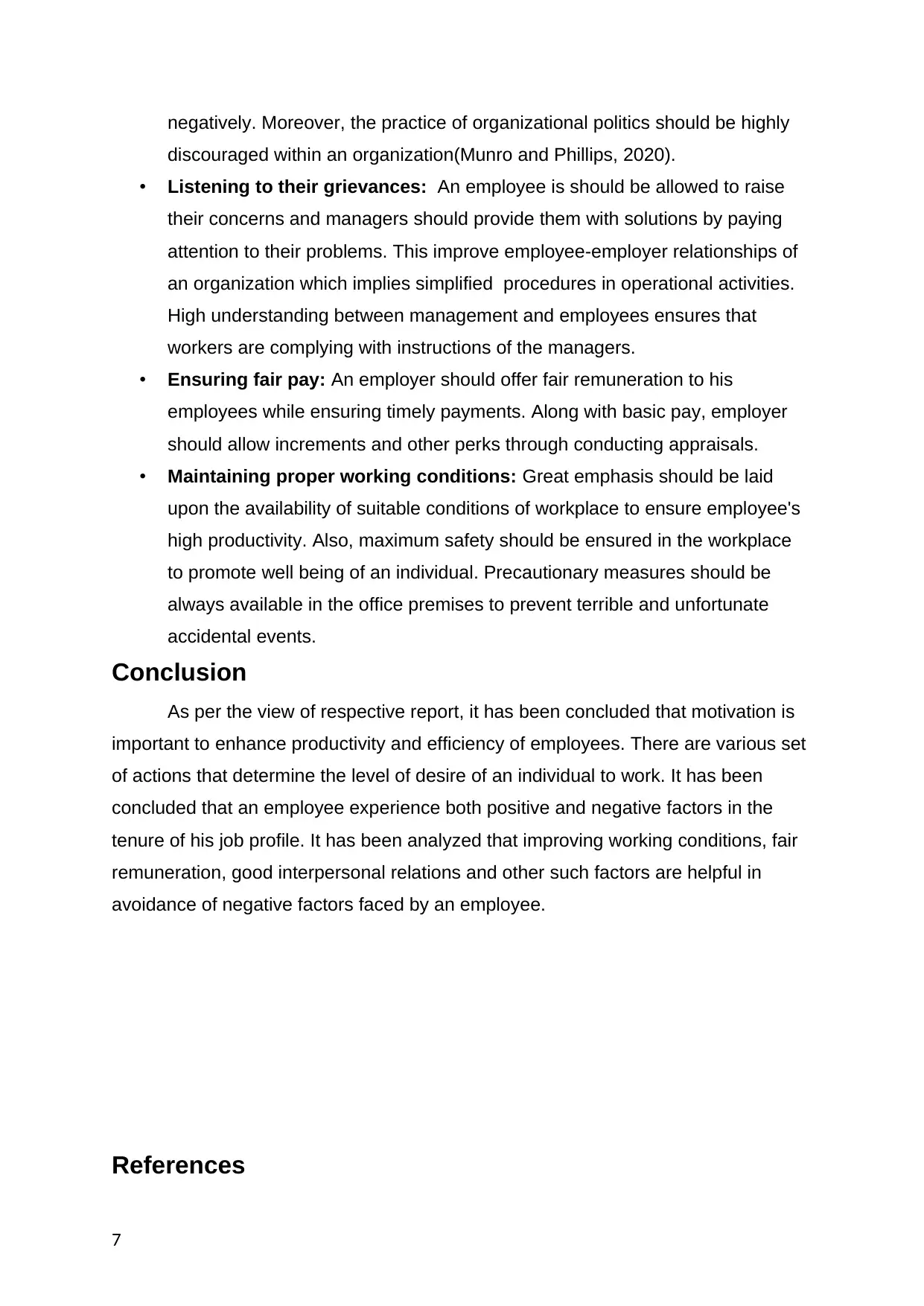
negatively. Moreover, the practice of organizational politics should be highly
discouraged within an organization(Munro and Phillips, 2020).
• Listening to their grievances: An employee is should be allowed to raise
their concerns and managers should provide them with solutions by paying
attention to their problems. This improve employee-employer relationships of
an organization which implies simplified procedures in operational activities.
High understanding between management and employees ensures that
workers are complying with instructions of the managers.
• Ensuring fair pay: An employer should offer fair remuneration to his
employees while ensuring timely payments. Along with basic pay, employer
should allow increments and other perks through conducting appraisals.
• Maintaining proper working conditions: Great emphasis should be laid
upon the availability of suitable conditions of workplace to ensure employee's
high productivity. Also, maximum safety should be ensured in the workplace
to promote well being of an individual. Precautionary measures should be
always available in the office premises to prevent terrible and unfortunate
accidental events.
Conclusion
As per the view of respective report, it has been concluded that motivation is
important to enhance productivity and efficiency of employees. There are various set
of actions that determine the level of desire of an individual to work. It has been
concluded that an employee experience both positive and negative factors in the
tenure of his job profile. It has been analyzed that improving working conditions, fair
remuneration, good interpersonal relations and other such factors are helpful in
avoidance of negative factors faced by an employee.
References
7
discouraged within an organization(Munro and Phillips, 2020).
• Listening to their grievances: An employee is should be allowed to raise
their concerns and managers should provide them with solutions by paying
attention to their problems. This improve employee-employer relationships of
an organization which implies simplified procedures in operational activities.
High understanding between management and employees ensures that
workers are complying with instructions of the managers.
• Ensuring fair pay: An employer should offer fair remuneration to his
employees while ensuring timely payments. Along with basic pay, employer
should allow increments and other perks through conducting appraisals.
• Maintaining proper working conditions: Great emphasis should be laid
upon the availability of suitable conditions of workplace to ensure employee's
high productivity. Also, maximum safety should be ensured in the workplace
to promote well being of an individual. Precautionary measures should be
always available in the office premises to prevent terrible and unfortunate
accidental events.
Conclusion
As per the view of respective report, it has been concluded that motivation is
important to enhance productivity and efficiency of employees. There are various set
of actions that determine the level of desire of an individual to work. It has been
concluded that an employee experience both positive and negative factors in the
tenure of his job profile. It has been analyzed that improving working conditions, fair
remuneration, good interpersonal relations and other such factors are helpful in
avoidance of negative factors faced by an employee.
References
7
Paraphrase This Document
Need a fresh take? Get an instant paraphrase of this document with our AI Paraphraser

Brach, B. and et.al., 2019, July. Meaning Making in the Workplace: A Deep Dive into
the Intricacies. In Academy of Management Proceedings (Vol. 2019, No. 1, p.
13911). Briarcliff Manor, NY 10510: Academy of Management.
Collie, R.J., Granziera, H. and Martin, A.J., 2018. Teachers’ perceived autonomy
support and adaptability: An investigation employing the job demands-
resources model as relevant to workplace exhaustion, disengagement, and
commitment. Teaching and Teacher Education, 74, pp.125-136.
Cucina, J.M. and et.al., 2018. Generational differences in workplace attitudes and
job satisfaction: Lack of sizable differences across cohorts. Journal of
Managerial Psychology.
Deif, A., 2019. Impact of Gamification on Learning and Motivation of Workforce: A
Student‐Based Study. The Wiley Handbook of Global Workplace Learning,
pp.577-590.
Mahmoud Ali El-Zeiny, R., 2018. Interior Design of Workplace and Performance
Relationship: Private sector corporations in Egypt.
Munro, C.E. and Phillips, A.W., 2020. Bullying in the workplace. Surgery (Oxford).
Treadway, D.C. and et.al., 2021. Strategic Silencing: A Political Perspective on the
Workplace Bully–Bystander Relationship. Special Topics and Particular
Occupations, Professions and Sectors, pp.55-74.
8
the Intricacies. In Academy of Management Proceedings (Vol. 2019, No. 1, p.
13911). Briarcliff Manor, NY 10510: Academy of Management.
Collie, R.J., Granziera, H. and Martin, A.J., 2018. Teachers’ perceived autonomy
support and adaptability: An investigation employing the job demands-
resources model as relevant to workplace exhaustion, disengagement, and
commitment. Teaching and Teacher Education, 74, pp.125-136.
Cucina, J.M. and et.al., 2018. Generational differences in workplace attitudes and
job satisfaction: Lack of sizable differences across cohorts. Journal of
Managerial Psychology.
Deif, A., 2019. Impact of Gamification on Learning and Motivation of Workforce: A
Student‐Based Study. The Wiley Handbook of Global Workplace Learning,
pp.577-590.
Mahmoud Ali El-Zeiny, R., 2018. Interior Design of Workplace and Performance
Relationship: Private sector corporations in Egypt.
Munro, C.E. and Phillips, A.W., 2020. Bullying in the workplace. Surgery (Oxford).
Treadway, D.C. and et.al., 2021. Strategic Silencing: A Political Perspective on the
Workplace Bully–Bystander Relationship. Special Topics and Particular
Occupations, Professions and Sectors, pp.55-74.
8
1 out of 8
Related Documents
Your All-in-One AI-Powered Toolkit for Academic Success.
+13062052269
info@desklib.com
Available 24*7 on WhatsApp / Email
![[object Object]](/_next/static/media/star-bottom.7253800d.svg)
Unlock your academic potential
Copyright © 2020–2026 A2Z Services. All Rights Reserved. Developed and managed by ZUCOL.



